Launching a startup is like setting sail on uncharted waters. You have a vision, a burning passion, and a belief that your idea can change the world. But even the most brilliant idea needs a strong crew to navigate the choppy seas of the startup world. Building a winning startup team is the foundation upon which your dream will either rise or fall.
This comprehensive guide will dive deep into the art and science of building a stellar startup team from scratch. From identifying key roles to nurturing a thriving culture, we’ll cover everything you need to know to assemble a crew that’s ready to weather any storm and steer your startup toward success.
Why Your Startup Team Matters More Than You Think
Before we delve into the “how,” let’s understand the “why.” Why is building a great startup team so crucial?
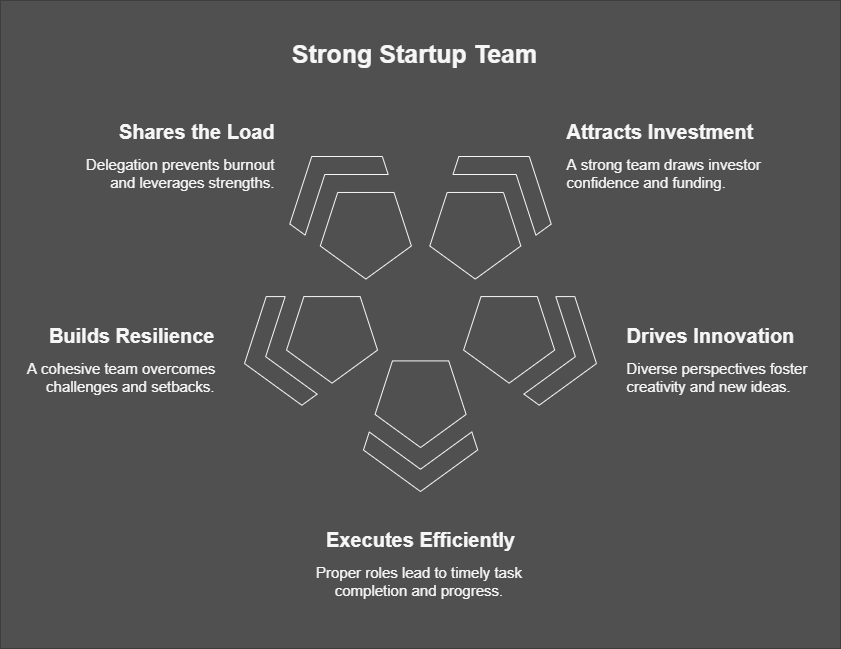
- Teams Attract Investment: Investors are more likely to bet on a strong team than just a brilliant idea. They understand that a capable team can adapt, pivot, and execute effectively, even when faced with unexpected challenges.
- Teams Drive Innovation: A diverse team brings a wealth of perspectives, experiences, and problem-solving approaches to the table, fostering a culture of creativity and innovation.
- Teams Execute Efficiently: When you have the right people in the right roles, tasks are completed more efficiently, deadlines are met, and progress is accelerated.
- Teams Build Resilience: Startups face constant hurdles and setbacks. A strong team provides the support, encouragement, and shared determination needed to overcome obstacles and emerge stronger.
- Teams Share the Load: Starting a business is incredibly demanding. A well-rounded team allows you to delegate responsibilities, leverage individual strengths, and avoid burnout.
Step 1: Define Your Startup’s DNA – Core Values
Before you start looking for team members, you need to define the core values that will shape your startup’s culture. These values are the guiding principles that will attract the right people and create a work environment where everyone feels aligned and motivated.
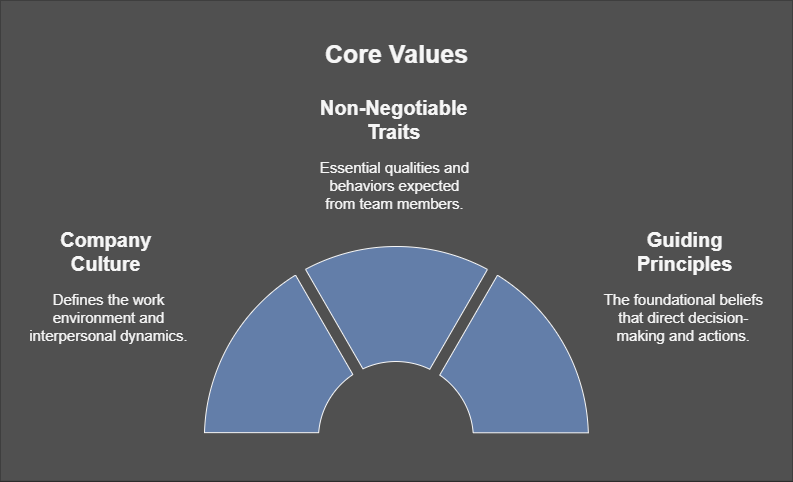
Ask yourself:
- What kind of company culture do you want to create? Do you envision a fast-paced, results-driven environment, or a more collaborative and supportive one?
- What are the non-negotiable behaviors and traits you expect from your team members? This could include things like integrity, passion, commitment to excellence, or a customer-centric mindset.
Document your core values and use them as a filter throughout the hiring process.
Step 2: Laying the Foundation – Identify Essential Roles
Startups often begin with a lean team, focusing on the most critical roles needed to get the business off the ground. As your startup grows, you can expand your team to include specialized roles. Here are some of the core team roles that many startups prioritize:
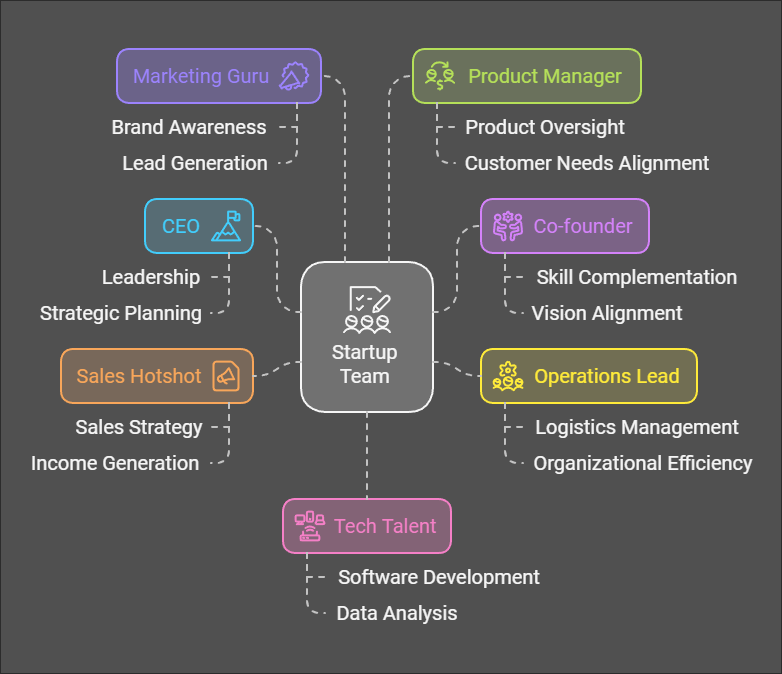
- CEO (Chief Executive Officer): The visionary leader responsible for setting the overall strategy, managing operations, and driving growth. Key CEO skills include leadership, strategic planning, financial management, and the ability to inspire and motivate a team.
- Co-founder: A strong co-founder can complement your skillset, share the workload, and provide valuable support and partnership. Look for someone who shares your vision, brings different strengths to the table, and is equally passionate about the business.
- Operations Lead: This person is the backbone of your startup, ensuring that everything runs smoothly behind the scenes. They manage day-to-day operations, handle logistics, and keep things organized.
- Sales Hotshot: Revenue is the lifeblood of any business, and a skilled salesperson is essential for driving sales and generating income.
- Marketing Guru: A marketing expert will help you build brand awareness, reach your target audience, and generate leads.
- Product Manager: If you’re developing a product, a product manager will oversee the product development process, ensuring that it meets customer needs and aligns with the overall business strategy.
- Tech Talent: Depending on your startup’s nature, you may need software developers, web designers, data analysts, or other technical experts. EPAM Startups & SMBs provides access to a global pool of top tech talent, including developers specializing in various programming languages and technologies.
Step 3: Unicorn vs. Zebra: Choosing the Right Mindset
In the startup world, there’s often a focus on finding “unicorn” employees — those rare individuals with exceptional talent and a track record of extraordinary success. However, chasing unicorns can be a risky strategy, as they may not always be the best fit for a startup’s collaborative environment.
Instead, consider building a team of “zebras” — individuals who are:
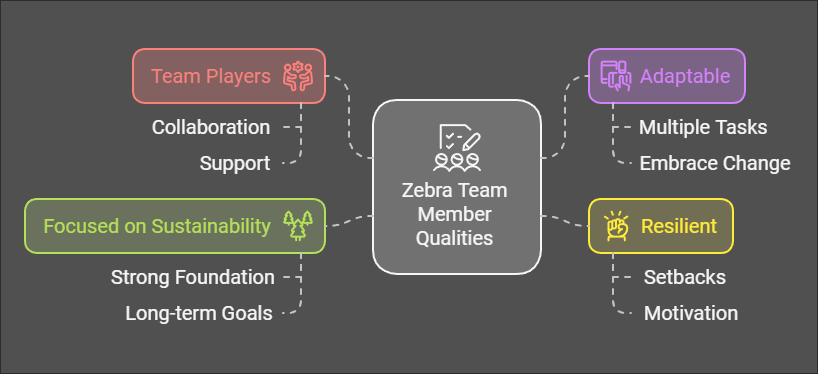
- Team Players: They prioritize collaboration, support each other, and work towards shared goals.
- Adaptable: They can handle multiple tasks, embrace change, and adjust to the evolving needs of a startup.
- Resilient: They can handle setbacks, bounce back from challenges, and remain motivated even when things get tough.
- Focused on Sustainability: They prioritize building a strong foundation for long-term success, not just chasing quick wins.
Remember, building a winning team is about finding the right balance of skills, experience, and cultural fit.
Step 4: Building Your A-Team: Where to Find Talent
Now that you know the roles you need to fill and the type of individuals you’re looking for, it’s time to start searching for talent. Here are some effective ways to find potential team members:

- Networking: Attend industry events, connect with people on LinkedIn, and leverage your personal network to find talented individuals.
- Job Boards: Post job openings on popular job boards like Indeed, LinkedIn, and specialized industry platforms.
- Recruiting Agencies: Recruiting agencies can help you find qualified candidates, saving you time and effort. EPAM Startups & SMBs offers recruiting services specifically tailored to startups, helping you find top talent at affordable costs.
- University Career Fairs: If you’re looking for recent graduates with fresh perspectives and a hunger to learn, university career fairs can be a great source of talent.
Step 5: Beyond the Resume: The Art of the Startup Interview
Once you’ve identified potential candidates, it’s time to conduct interviews to assess their skills, experience, and cultural fit. Here are some key tips for conducting effective startup interviews:

- Go Beyond Technical Skills: While technical skills are important, don’t overlook soft skills like communication, teamwork, problem-solving, and adaptability.
- Assess Cultural Fit: Use behavioral interview questions to gauge whether the candidate’s values and work style align with your startup’s culture.
- Present Your Vision: Share your passion for the business and paint a clear picture of your vision for the future. This will help you attract candidates who are genuinely excited about your company’s mission.
- Ask Thought-Provoking Questions: Encourage candidates to think critically and demonstrate their problem-solving abilities. Ask questions like:
- “Tell me about a time you faced a challenging situation at work and how you overcame it.”
- “What are your biggest strengths and weaknesses?”
- “Why are you interested in working for a startup?”
- “Where do you see yourself in five years?”
- Engage in Two-Way Communication: Allow candidates to ask questions and get a better understanding of the role, the company, and the culture. This will help you ensure that both parties are a good fit for each other.
Step 6: In-House, Remote, or Freelance? Choosing the Right Engagement Model
Startups have different options when it comes to building their teams:

- In-House Developers: Hiring in-house provides the benefit of close collaboration, shared passion, and a strong sense of team spirit. However, it can be more costly and less flexible than other options.
- Remote Developers: Remote work is becoming increasingly popular, offering startups access to a global talent pool and the ability to scale their teams quickly and cost-effectively.
- Freelancers: Freelancers can be a good option for short-term projects or specialized tasks. However, they may not be as invested in your startup’s long-term success as full-time employees.
EPAM Startups & SMBs offers both team extension and dedicated team options, allowing you to choose the model that best suits your needs and budget.
Step 7: Onboarding: Setting the Stage for Success
Once you’ve hired your dream team, it’s crucial to have a structured onboarding process to integrate new hires into the company culture and set them up for success.
Here are some key elements of an effective onboarding process:
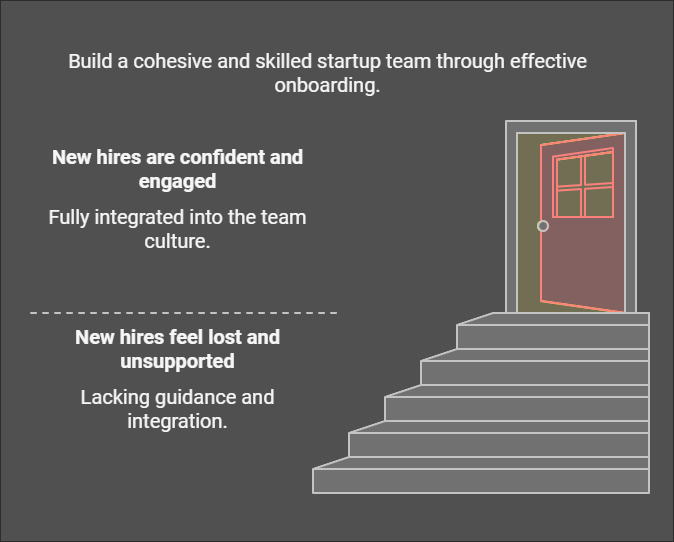
- Welcome and Orientation: Make new hires feel welcome and valued from day one. Provide them with all the information they need to get started, including company policies, procedures, and expectations.
- Introduction to Team and Culture: Introduce new hires to the team and give them a chance to learn about the company’s culture and values.
- Role-Specific Training: Provide role-specific training to ensure that new hires have the skills and knowledge they need to perform their jobs effectively.
- Regular Check-ins: Schedule regular check-ins to provide feedback, answer questions, and address any concerns.
- Mentorship: Consider pairing new hires with experienced team members who can provide guidance and support.
Step 8: Nurturing a Thriving Team Culture
Building a strong team goes beyond just hiring the right people. It’s about creating a work environment where people feel valued, motivated, and inspired to do their best work.
Here are some tips for nurturing a thriving team culture:
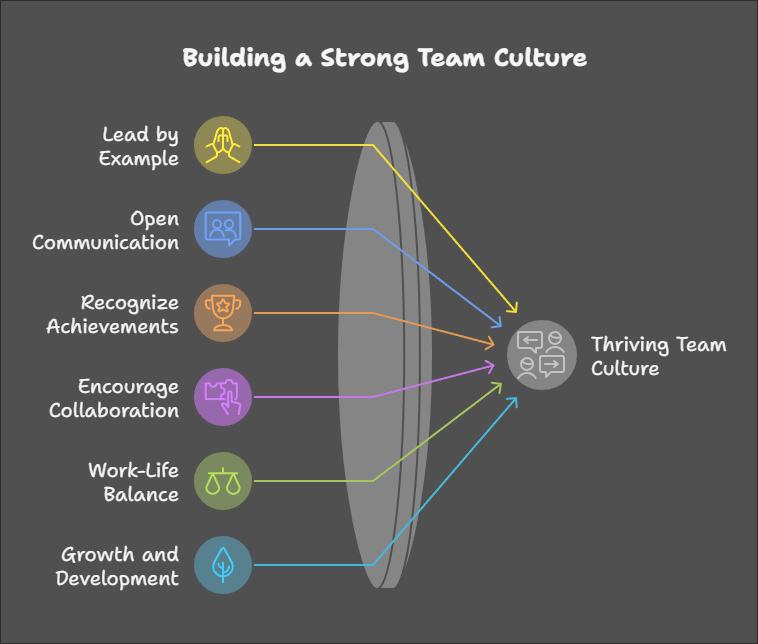
- Lead by Example: As a leader, you set the tone for the entire team. Embody the values you want to see in your team members, be respectful, supportive, and approachable.
- Communicate Openly and Transparently: Keep your team informed about company updates, challenges, and successes. Encourage open dialogue and feedback.
- Recognize and Reward Achievements: Celebrate team wins, both big and small. Recognize individual contributions and show your appreciation for their hard work.
- Encourage Collaboration and Teamwork: Create opportunities for team members to work together, share ideas, and support each other.
- Promote Work-Life Balance: Encourage your team to take breaks, prioritize their well-being, and avoid burnout. This could include offering flexible work arrangements, generous vacation time, or wellness benefits.
- Invest in Growth and Development: Provide opportunities for your team members to learn new skills, attend industry events, and advance their careers. This shows them that you’re invested in their growth and that you value their contributions.
Step 9: Building Loyalty: The Power of Deep Relationships
The leaders who build the most loyal teams are those who go beyond superficial interactions and build deep, meaningful relationships with their team members.
This involves:

- Getting to Know Your Team on a Personal Level: Take the time to learn about their families, their interests, their goals, and their aspirations.
- Creating a Supportive and Inclusive Environment: Make everyone feel valued and respected, regardless of their background, experience, or role.
- Showing Genuine Care and Concern: Be there for your team members when they need support, whether it’s personal or professional.
- Investing in Their Growth and Development: Provide opportunities for learning, mentorship, and career advancement.
- Celebrating Successes Together: Acknowledge and celebrate team wins, both big and small. This fosters a sense of shared accomplishment and strengthens bonds.
Step 10: Hire Slow, Fire Fast: Building a High-Performing Team
While it’s tempting to fill roles quickly, it’s more important to be selective and find the right people who are a true fit for your startup’s culture and goals.
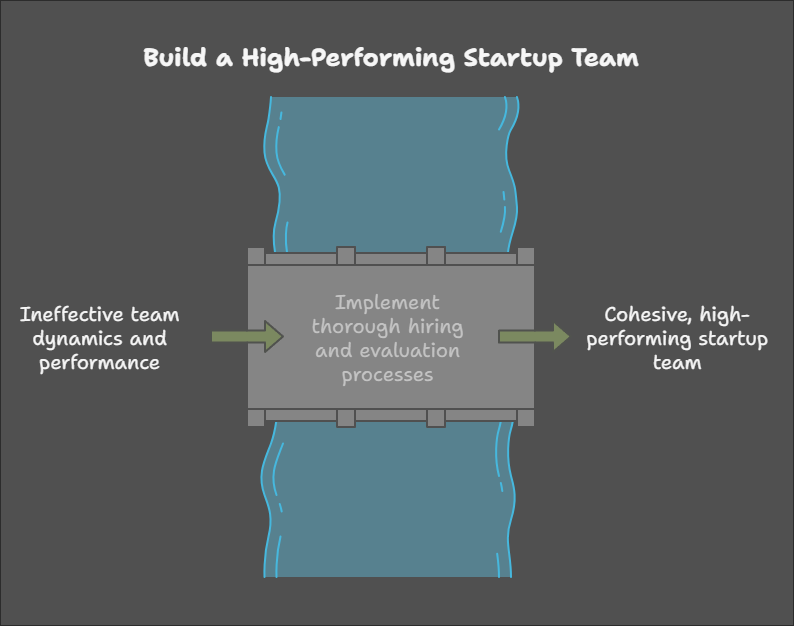
This means:
- Taking Your Time with the Hiring Process: Conduct thorough interviews, check references, and assess cultural fit.
- Being Willing to Let Go of People Who Aren’t a Good Fit: Holding on to employees who are not performing well or who are not aligned with your values can be detrimental to your startup’s success.
- Continuously Evaluating Your Team’s Performance: Set clear expectations, provide regular feedback, and address performance issues promptly.
Conclusion: Your Startup Team is Your Greatest Asset
Building a strong startup team is a journey, not a destination. It requires ongoing effort, dedication, and a commitment to nurturing a positive and supportive work environment.
By following the steps outlined in this guide, you can assemble a team of talented, passionate individuals who are ready to join you on the exciting and challenging adventure of building a successful startup. Remember, your startup team is your greatest asset. Invest in them, empower them, and support them, and they will propel your vision forward.